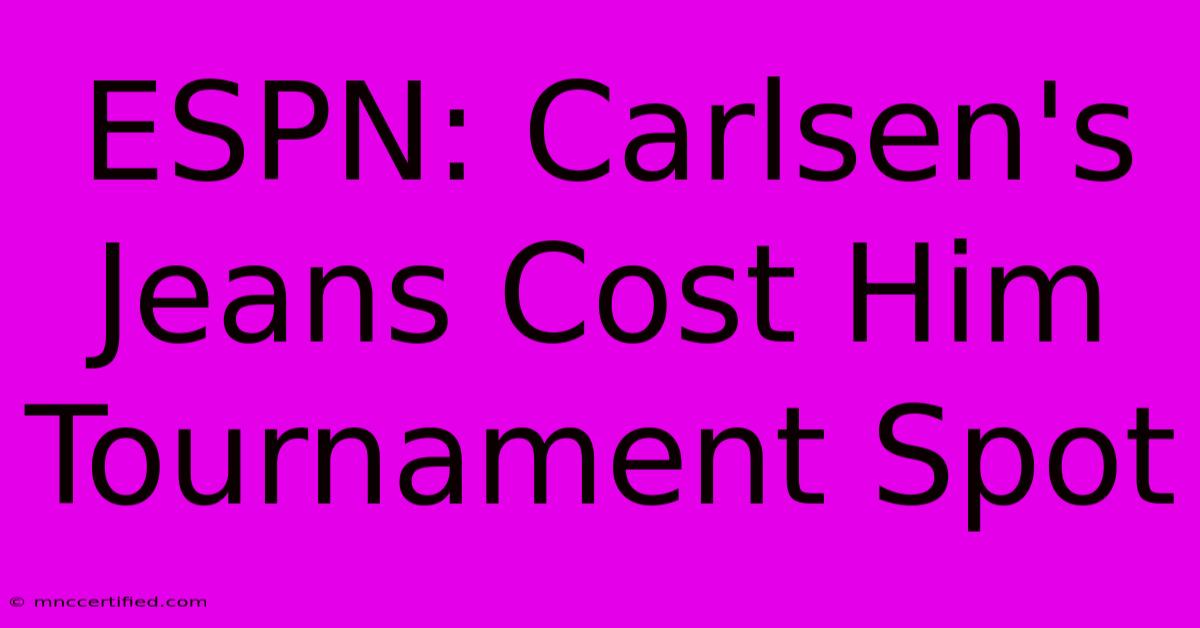ESPN: Carlsen's Jeans Cost Him Tournament Spot

Table of Contents
ESPN: Carlsen's Jeans Cost Him Tournament Spot? A Deep Dive into the Controversy
The chess world was abuzz recently after a report (though later denied by ESPN) suggested that World Champion Magnus Carlsen's choice of attire – a pair of jeans – might have cost him a spot in a prestigious tournament. This seemingly trivial detail sparked a larger conversation about dress codes, professionalism, and the evolving image of chess in the modern era. Let's delve into the controversy, examining the facts (or lack thereof), the potential implications, and the wider context of the situation.
The Alleged ESPN Report: Jeans and Tournament Exclusion
The initial reports, seemingly originating from an ESPN source, claimed that Carlsen was denied entry into a high-profile tournament due to his casual attire. The alleged infraction? A pair of jeans, deemed inappropriate by the tournament organizers. This sparked immediate outrage among chess fans and commentators, with many questioning the validity of such a stringent dress code. The crucial point is that ESPN has since denied publishing any such article. The rumour spread rapidly through social media and online chess communities, highlighting the power of misinformation in the digital age.
Fact-Checking the Claims: Separating Fact from Fiction
It's vital to emphasize that, as of now, there is no verifiable evidence supporting the claim that Carlsen was excluded from a tournament because of his jeans. The alleged ESPN report remains unconfirmed and unsubstantiated. This underscores the importance of verifying information from reputable sources before sharing it, especially in the fast-paced world of online news.
The Wider Debate: Dress Codes and Professionalism in Chess
Regardless of the truth behind the initial report, the controversy ignited a necessary debate about dress codes and expectations of professionalism in the chess world. Traditionally, chess has been associated with formal attire, reflecting a certain level of decorum and respect for the game. However, times are changing. The rise of online chess and a younger generation of players have challenged these established norms.
Evolving Norms and the Modern Image of Chess
Many argue that a relaxed dress code can foster a more inclusive and welcoming environment for players of all backgrounds. Forcing a strict dress code could alienate potential participants and hinder the growth of the game. Conversely, others believe that maintaining a certain level of formality upholds the prestige and intellectual gravity associated with chess.
The Impact of Social Media: Amplifying Misinformation
The rapid spread of the alleged ESPN report serves as a stark reminder of the power and potential pitfalls of social media. False or unsubstantiated news can quickly go viral, causing confusion, misinterpretations, and, in this case, potentially damaging the reputation of both Magnus Carlsen and the tournament organizers (if they were indeed wrongly implicated).
The Importance of Media Literacy in the Digital Age
This incident highlights the crucial need for media literacy. Learning to critically evaluate information sources, identify misinformation, and verify claims before sharing them online is paramount in today's digital landscape.
Conclusion: A Lesson in Verification and Evolving Norms
While the initial report about Carlsen being barred from a tournament due to jeans remains unverified and officially denied by ESPN, the controversy sparked valuable discussions about dress codes, professionalism, and the changing face of chess. The incident also serves as a cautionary tale about the rapid spread of misinformation in the digital age and the importance of media literacy. It's time for a nuanced conversation, moving beyond the initial rumour to consider the future of dress codes and image in the world of professional chess.

Thank you for visiting our website wich cover about ESPN: Carlsen's Jeans Cost Him Tournament Spot. We hope the information provided has been useful to you. Feel free to contact us if you have any questions or need further assistance. See you next time and dont miss to bookmark.
Featured Posts
-
Breaking Free From A Bad Friendship
Dec 29, 2024
-
Darts Live Littlers Ominous Warning
Dec 29, 2024
-
Diamondbacks 210 M Burnes Deal
Dec 29, 2024
-
Nebraska Football Boston Game Statistics
Dec 29, 2024
-
Ward Breaks Keenums Td Record
Dec 29, 2024